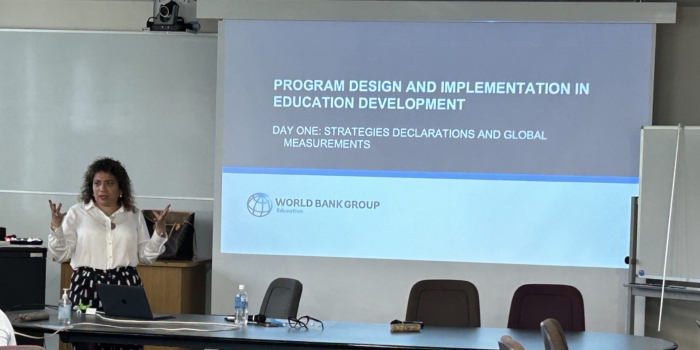Field Study in Washington, D.C. (Katsuki SAKAUE)
I participated in the overseas training in Washington, D.C. for two weeks from March 7 to 20, 2015. The overall purpose of attending the training is to deepen the knowledge...
Graduate School of International Cooperation Studies (GSICS), Kobe University


Dr. Scherezad Latif is an Education Practice Manager at the World Bank, overseeing and guiding the strategic direction of education projects and programs across West and Central African countries. She has extensive experience working in diverse contexts, particularly those affected by Fragile Conflict and Violence (FCV), including Afghanistan, Pakistan, Moldova, Ukraine, Tajikistan, Uzbekistan, Kazakhstan, Guinea, and the Democratic Republic of Congo (DRC). She has led large World Bank operations, many of which are results-based, including the largest education project for the Bank in the DRC. Dr. Latif holds a Ph.D. in Education from Columbia University and a Master’s in Education from the Harvard Graduate School of Education.
 During her stay at Kobe University’s Graduate School of International Cooperation Studies (GSICS) from July 1st to July 24 2024, Dr. Latif delivered an intensive course on “Development Management” and provided an overview of the practical aspects of development management, focusing on education cooperation at the global level, especially from the perspective of the World Bank. She offered lectures on various relevant education development topics, such as the challenges and future direction of development management in Africa; foundational learning and learning poverty; girls’ education and empowerment; strategies, declarations and global measurements; early childhood education; technical and vocational education; higher education; skill development; education finance; (Education and Technology) EdTech; translating policies into programs; program design and implementation in education development. Additionally, Dr. Latif invited specialists in these topics, and they delivered comprehensive and informative lectures on each theme with diverse expert insights.
During her stay at Kobe University’s Graduate School of International Cooperation Studies (GSICS) from July 1st to July 24 2024, Dr. Latif delivered an intensive course on “Development Management” and provided an overview of the practical aspects of development management, focusing on education cooperation at the global level, especially from the perspective of the World Bank. She offered lectures on various relevant education development topics, such as the challenges and future direction of development management in Africa; foundational learning and learning poverty; girls’ education and empowerment; strategies, declarations and global measurements; early childhood education; technical and vocational education; higher education; skill development; education finance; (Education and Technology) EdTech; translating policies into programs; program design and implementation in education development. Additionally, Dr. Latif invited specialists in these topics, and they delivered comprehensive and informative lectures on each theme with diverse expert insights.
Dr. Latif’s interactive lectures had a profound impact on the students at GSICS. Her extensive experience in education development at the World Bank, particularly in fragile and conflict-affected contexts, provided students with a unique and practical perspective on the challenges and strategies in global education cooperation. Her deep insights into education finance, program design, and implementation were valuable, offering students a comprehensive understanding of the complexities involved in education development projects of the World Bank.
 In the final presentation, Dr. Latif guided students in building hypothetical education development projects similar to those at the World Bank. This hands-on approach helped students understand the mechanisms involved in designing and planning large-scale education projects. The practical examples and case studies she presented bridged the gap between theory and practice, enabling students to grasp the real-world implications of their studies. Dr. Latif’s discussions, based on firsthand experience, inspired students to think critically and innovatively about solutions to education challenges.
In the final presentation, Dr. Latif guided students in building hypothetical education development projects similar to those at the World Bank. This hands-on approach helped students understand the mechanisms involved in designing and planning large-scale education projects. The practical examples and case studies she presented bridged the gap between theory and practice, enabling students to grasp the real-world implications of their studies. Dr. Latif’s discussions, based on firsthand experience, inspired students to think critically and innovatively about solutions to education challenges.
Lastly, I would like to thank Professor Keiichi Ogawa for inviting Dr. Latif to deliver the course, Dr. Loleka Yungu Bernard (PhD from GSICS and Education Economist at the World Bank) and Kohei Uno (Teaching Assistant for the course) for assisting in her visit to Japan.
Authored by Mubin Khan Afridi (Master’s Student)